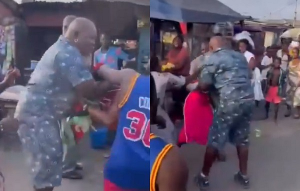Private Legal Practitioner, Martin Kpebu, has downplayed calls by pro-New Patriotic Party [NPP] Pressure Group, Alliance for Accountable Governance [AFAG], for the Chairperson of the Electoral Commission and her deputies to be suspended by the President, saying the group does not have the locus to make such demands.
AFAG’s Vice President, Henry Asante, who made the call at a news conference in Accra, said the continuous stay of the officers could jeopardize ongoing investigations into allegations of malfeasance leveled against them.
He, therefore, asked President Akufo Addo to direct the three officers to proceed on leave.
However, Mr. Kpebu in a rebuttal explained that AFAG cannot make such demands, given that “it is not a party to the proceedings.”
Mr. Kpebu was however quick to add that, petitioners who called for the three EC officials’ removal could file an application for their interdiction if their actions interfere with ongoing investigations, adding that the onus would subsequently lie on the Judicial Council to either grant or reject the application.
“It’s something that will be made or must be made by the petitioners if they have grounds to fear that the respondents, that is the Commissioner and the other Deputy Chairpersons, can interfere with the transfers by castrating their efforts at getting evidence from the EC offices.
“Basically, it is a right conferred on the petitioners. When I say right, what I mean is that, it is their right to make their application, but as to whether their application will be granted or not will depend on the advice of the Judicial Council. When they make that request, it will be looked at by the panel, actually, the Judicial Council, then they will advise the President. Looking at the law, to the extent that AFAG is not a party to the proceedings, that request [interdiction] or application cannot properly come from them,” the lawyer explained on Eyewitness News.
Petitions
Some staff of the EC petitioned President Nana Addo Dankwa Akufo-Addo in July 2017, to remove Mrs. Osei from office over allegations of fraud and financial malfeasance as well as abuse of office.
Some of the allegations involved the unilateral award of contracts by the EC boss in the run-up to the 2016 general election.
The petition against her, alleged among others the funnelling of GH¢3.9 million to partition an office, the receipt of a Toyota Land Cruiser from the Mahama government, and the use of about $14 million when the Public Procurement Authority had authorized her to use only $7.5 million.
Amadu Sulley ‘illegally’ took GHC 6m from parties – Charlotte Osei
Mrs. Osei also responded by making allegations of corruption against her deputies, claiming that she was only being hounded because she sought to introduce systems to curb misuse and mismanagement of resources.
Fresh impeachment against EC Chair
Subsequently, another individual by name Douglas Seidu, a concerned Ghanaian, also petitioned the President in August 2017, seeking the removal of the EC Chair, on grounds of “financial misconduct, incompetence, conflict of interest, breaches of the public procurement processes, amongst others.
President Akufo-Addo in accordance with the constitution forwarded both petitions to the Chief Justice to look into the matter, the outcome of which is now a Committee to investigate the three.
Charlotte Osei could remain in office during corruption probe – Lawyer
Meanwhile, a private legal practitioner, Yaw Oppong, had suggested to Citi News that, the Chairperson of the Electoral Commission, Charlotte Osei, could remain in her position while a probe is conducted into alleged acts of malfeasance by her and two deputies at the Commission.
The Chief Justice and the Judicial Council, may recommend to the President of the Republic, the suspension of the EC Chair from her position, to enable her to undergo the hearing.
However, according to Yaw Oppong, unless it is established that her continued stay in office would compromise the investigations, Charlotte Osei could be allowed to remain in her position while she and her deputies are probed.
“In my view, unless it can be seen that the person who is the subject of such an investigation is capable of interfering with the investigation process in terms of suspected cases of concealment of documentary or other forms of information, otherwise I think those persons can still occupy their position,” he said on Eyewitness News.
Yaw Oppong added that, even if the President accepts the recommendation of the Judicial Council and suspends the EC Chair, he could, at any time, reinstate her should he feel the need to do so.
“If the President is of the view that any useful purpose will be served by the person who is the subject of this investigation stepping aside or being suspended in the meantime [he can do so]. But at the same time, Clause 11 says that the President may at any time revoke the suspension under this Article. Perhaps it may be used, but if any purpose may be served by the person being brought back to the position, the President has the power to do so,” he explained.
President not bound by recommendations
Yaw Oppong also suggested that, the President may not be compelled to implement the recommendations of the Judicial Council should they call for the suspension of Charlotte Osei.
Citing a similar case in which the Supreme Court ruled that the President was not bound by the advice of the Council of State, Yaw Oppong stated that, it was however vital that the President is seen to have sought the advice of the Judicial Council on the issue, as stated by the Constitution.
General News of Friday, 26 January 2018
Source: classfmonline.com

















